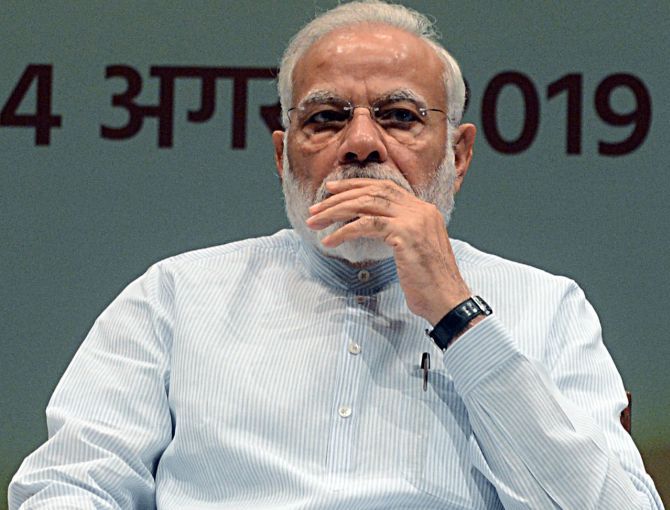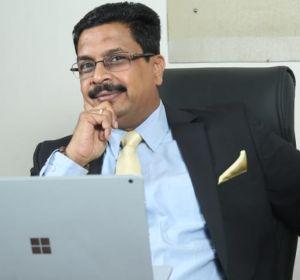'The IAS officers are after the rich people, the IRS officers are after the middle class and the IPS officers are after the poor. This is the new varnashrama created by the bureaucracy.'

After the tragic death of the Café Coffee Day founder V G Siddhartha, many people have started talking about the kind of tax terrorism that exists in the country.
Two years ago, M R Venkatesh, below, the chartered accountant turned advocate, told Rediff.com that what we were going to witness would be tax jihadism because he felt tax terrorism was a mild word!
He said this after the Narendra Modi government implemented GST with the promise that it would end tax terrorism!
In an interview to Rediff.com's Shobha Warrier now, MRV, as he is popularly known, says, "There is a crisis in the economy with respect to tax terrorism."
Tax terrorism has become a popular word in India now. Seemingly, it was Narendra Modi who first coined the word ‘tax terrorism’ when he said, ‘Tax terrorism prevailing in the country is dangerous. One can’t run the government thinking everyone is a thief.’ Now, are we not seeing the same thing under his regime too, perhaps on a far worse level?
One of the biggest USP of Narendra Modi in 2014, especially with regards to the middle class and the small and medium businesses, was this tax terrorism that he spoke about.
If you remember, in one of my interviews with you, I had used the word tax jihadism. Those of us who handle the income tax department or the GST or the customs or the excise department on a daily basis, can see that the kind of powers given to the officers today.
And of course, we can contrast it with the lack of accountability you see in them too. That is, you have empowered them totally but with no accountability. And they have gone berserk.
The problem today is that tax revenue collections have become very aggressive because the government wants money as it is on a spending spree.
So, all the three combined has created a fertile ground for tax jihadism.
Would you say that tax terrorism which Narendra Modi spoke about when the UPA was ruling became tax jihadism under his rule?
Of course. It will become worse when the next man comes. That is because we are not addressing the root of the problem, and the root of the problem is threefold; excessive expenditure by the government leading to a need for excessive income for the government, then comes the extraordinary powers given to the tax officials to meet such extraordinary income targets, and the third problem is, lack of accountability for the officials.
For example, today somebody in the IT department can make an assessment that you have to pay Rs 100 crore extra as tax. Though it may get quashed at the high court level, but there is nobody to ask the particular official on what basis he made such a high-pitched assessment.
For him, the only goal is to somehow or the other collect so many crores in his circle. So, what he does is, he looks for enhancement in every single person who files a return. It is not only enhancement but also levy through penalty. And there is not only penalty but also a threat of prosecution.
This is adding to a corrosive toxic atmosphere and till you reach the high court, nobody is going to give you any relief or willing to give relief in the politically surcharged atmosphere.
 But how many people can afford to spend that much money?
But how many people can afford to spend that much money?
Exactly. And that is the problem people are facing today. That is the cost you have to pay for doing business. That is the cost you have to pay for honestly paying the tax.
What is this but tax jihadism when an honest tax-payer is pushed to a corner like this?
All over the world, tax-payers are looked at as honest people but in India, they are viewed as suspects or criminals. Why is it so?
We have a genetic problem in looking at prosperity and being rich. We somehow feel rich people are scoundrels. There is a socialist mentality in our collective thinking, that if you are rich, you have violated the law.
And that is because laws are created never to allow people to become rich, if you are rich, you are looked upon as a person who has broken the law. And, we have a sadistic pleasure in prosecuting a successful person.
You had said in one of our earlier interviews that the entire government was under the grip of bureaucracy and unless the grip was loosened, nothing was going to function properly. Why is it that the government cannot do it?
What I can understand is, the IAS officers are after the rich people, the IRS officers are after the middle class and the IPS officers are after the poor. This is the new varnashrama created by the bureaucracy.
Whenever we interact with the State, we see this huge amount of corrosive-sadistic element in our bureaucracy. Strangely, this is what Narendra Modi or a right-wing government must address if it believes that any mechanism of the State has to be pro-people and pro-business. The earlier this realisation dawns on this government, the better.
Unfortunately, this government is only expanding the scope of governance. What’s happening is exactly the opposite of what Narendra Modi had promised. The government is becoming bigger, and worse still, governance is suffering.
Regarding tax terrorism and harassment by government officials, what started off as a whisper soon after the budget presentation, became the most talked about topic after Siddhartha’s suicide….
There are several cases like Siddhartha’s, and there are many more cases where people have not committed suicide but are stoically suffering. The problem is that we are again going back to what should be done to deal with bureaucracy and make it efficient.
You should read a book titled Governance and sclerosis that has set in by Arun Shourie written two decades back. Once sclerosis sets in, it is irreversible.
If it is irreversible, it can be dangerous…
It is dangerous. All the economic reforms we are talking about is centred around only policy formulations, without understanding there is something called delivery. We are only talking about the nuclear bomb and not the missile; remember, the missile is as important as the bomb.
You can sit in a room and write hundred economic policies. But administrative reforms and judicial reforms are not happening. Till that happens, till you hold bureaucrats accountable, you can say economic reforms in this country have not yet matured.
Some experts say that taxation in India is draconian. Is it so?
The word draconian comes from a Greek ruler who wrote such bad laws. But if he were to read India’s tax laws and circulars of CBDT and CBIT, he would be called a successor of India’s tax laws and not otherwise! He will look like a kindergarten student in front of our tax laws.
The problem is, our tax laws are structured keeping in mind that everybody is a scoundrel, and every tax-payer and every assessee should be punished. And we pride in such masochist tax laws.
Then, even if they are honest, since they are successful, our view is that such successful assessees should be prosecuted. This is the British vintage tax structure.
The 1922 Act was changed to enact the 1961 Act. What we have today is much more draconian than what was written in 1961 during Nehru’s time. And believe me, the New Tax Code that the government is contemplating will be much more draconian than the present IT law.
Not only the law, administration is draconian and judicial system is draconian. Because laws, administration and judicial system are draconian, the tax system has completely broken down.
I would say, at times taxmen have become mercenaries between warring parties.
I think we are in for a very dangerous situation in terms of investment.
Who can bell the cat?
I will say, tackling Article 370 is much easier than any tax reform! It is easier to neutralise Article 370 than carry out tax reforms because tax reforms mean legislative, administrative and judicial reforms put together. It requires the efforts of a super human to reform all the three.
You just can’t do this in one or two budgets; it may need 10-15 years.
But this government which was supposed to put an end to tax terrorism, has made it worse…
Yes. As you know, I am a great supporter of this government. But when it comes to economics, especially tax terrorism, I have been quite vocal in pointing out that this government has been very lackadaisical in dealing with such situations.
As I have lost faith in the finance ministry to address this issue, I hope it will be taken on a war footing by the prime minister and his office. Otherwise, India as an investment destination will suffer significantly.
Is not 28% GST on automobiles also tax terrorism? Because of this, the auto sector in which many international companies also have invested, is going through such times and thousands of people are losing jobs. But the finance minister is unmoved by the sector’s demands…
The problem is, we still look at car as a luxury. They are forgetting the number of jobs the industry is creating.
Another issue is purely ideological. Whether you are making a car or a plane or a pin, the government must look at being tax neutral. The idea of GST is that you should have a tax neutral mindset to both pin or a plane. Because of a socialist mindset, we brought in several slabs and have complicated GST.
And because of this socialist thinking, we are taxing cars at 28%. Even the Narendra Modi government, which is supposedly a rightist government, gets easily caught between Gandhian socialism and Nehruvian Fabianism. Both these things, in my opinion, are useless policies which have to be thrown away.
So, you have very high tax rate, complicated tax laws, senseless administrative system and heartless judicial system. That’s why people like Mohandas Pai, who are otherwise big admirers of this government, are talking about tax terrorism. The net result -- the economy runs the risk of coming to a standstill.
On one side, the BJP is talking about the ills of Nehruvian socialism and on the other side, they also follow socialist mentality…
The problem is, we have a macho government which should be macho in terms of security, diplomacy and such things. When it comes to economics, it is better for a government to be minimalistic or residual.
Unfortunately, we want government intervention in everything. That means government has to necessarily spend. And where do we go to get that money for such expenditure other than through tax terrorism! The ever-expanding scope of government is at the root of tax terrorism.
It is like what you had said some time back, giving paracetamol to treat cancer..
Exactly. That’s what we are doing. We are only attempting a peripheral cure instead of a thorough diagnostic cure of the economy. I am sorry to say, none in the North Block, either in this government or the previous government, has the tenacity to look at it clinically.
What will happen now? We will have tougher days and suffering because we do not know how to deal with our macro-economic problems.
Are we in for a disaster?
I hope somehow, the crisis will trigger a way to wriggle out of it. I certainly believe a crisis of this nature will provide us a solution. Remember 1991.
But for the crisis, we would not have liberalised our economy. Probably, this crisis will make us liberalise to fight tax terrorism.
You mean the situation is as bad as 1991?
Yes, it has reached that level where once can certainly say that there is a crisis in the economy with respect to tax terrorism.
Is it like a dam ready to burst?
It has already burst. Siddhartha’s suicide is a case in point. There is not just one Siddhartha but several people are facing this at a far worse level. It is the enormous tolerance that they have ensures that they don’t commit suicide.
Do you think the prime minister who once spoke about tax terrorism will see the reality?
The prime minister is a very intelligent man and economically also, he is very savvy. But none of the industry captains have the spine to tell him the reality. They only speak of tax terrorism in hushed tones, they don’t talk about it openly.
What about people like Kiran Mazumdar Shaw or Mohandas Pai?
They are not captains of the industry. It is not like the CII or Rahul Bajaj making a statement. The legislative side, the administrative side and the judiciary side are collapsing but nobody is making a statement. I don’t know what they are afraid of.
Tax terrorism is so prevalent that it silences even the best of our honest and the best of our tax-payers.
When I say this, people in the BJP think I am only criticising. They ask me, ‘look at all the industry people. Nobody is talking about this. What’s your problem?
Narendra Modi talks about the need to fight terrorism all the time but do you think the real terrorism people face is this?
Yes, the way Narendra Modi government fought physical terrorism has been great but when it comes to fiscal or tax terrorism, it has been a remarkable failure.











 © 2025
© 2025